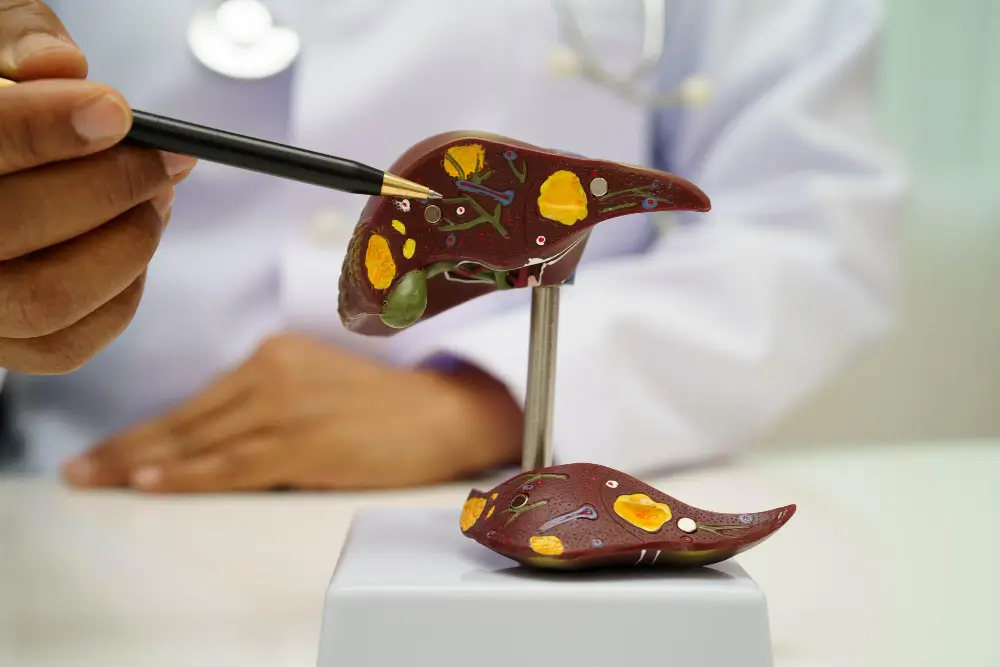Busy Life? Don’t Let Gallbladder Pain Hold You Back
Laparoscopic Gall Bladder Stone Surgery in Navi Mumbai
- Dr Nitish Jhawar, with 23 years of experience

Book An Appointment
What are Gallstones, and Why is Surgery Needed to Treat Them?
Gallstones are hard deposits that form in the gallbladder and can cause pain, digestive issues, and even infection if they block the bile ducts. They form due to imbalances in bile substances, often from too much cholesterol or bilirubin or incomplete gallbladder emptying.
When to Consider Laparoscopic Surgery for Gallbladder Stone Removal?
If you’re experiencing severe or recurring symptoms, it may be time to consider laparoscopic gallbladder surgery (laparoscopic cholecystectomy). Surgery is often recommended when:
- Pain episodes are frequent or intense.
- Symptoms affect daily activities and quality of life.
- Complications like inflammation or bile duct blockage arise.
What is Laparoscopic Gallbladder Stone Surgery?
Laparoscopic Gallbladder Stone Surgery, also known as Laparoscopic Cholecystectomy, is a minimally invasive procedure. It removes gallstones through small incisions, allowing for quicker recovery and reduced postoperative discomfort.
Benefits of Laparoscopic Gallbladder Stone Surgery Over Traditional Methods
- Less Pain: Smaller incisions mean less pain during recovery.
- Quick Recovery: Most patients return to daily activities within a week.
- Minimal Scarring: Tiny incisions leave minimal scars.
- Reduced Risk of Complications: Minimally invasive techniques lead to fewer complications.
Symptoms & Signs of Gallbladder Stones
Common symptoms that may indicate gallbladder stones include:
Severe Abdominal Pain
Often felt in the upper right abdomen and can radiate to the back or shoulder.
Nausea and Vomiting
Especially after meals, as the digestive system struggles with blocked bile.
Jaundic
A yellowing of the skin, signalling blocked bile ducts.
Digestive Issues
Bloating, gas, and indigestion, particularly after heavy meals.
Why Choose Laparoscopic Gall Bladder Stone Surgery in Navi Mumbai Apollo Hospital?
Compared to open surgery, laparoscopic gallbladder surgery offers significant benefits, including:
- Minimal Pain and Scarring: Small incisions mean less discomfort and barely noticeable scars.
- Quick Recovery: Faster healing, allowing a quick return to normal life.
- Reduced Risk of Complications: A safer procedure with fewer risks.
What to Expect During Laparoscopic Surgery for Gallbladder Stone Removal in Navi Mumbai, Neoalta Clinic Vashi
Pre-Surgery Preparation
Consultations with Dr. Nitish involve discussing symptoms, reviewing medical history, and completing tests like blood work and imaging. You’ll receive clear instructions on fasting, medication, and any pre-op preparations.
During the Surgery:
Anaesthesia
You’ll receive general anaesthesia for comfort.
Incisions
Dr. Nitish makes three to four small incisions.
Laparoscope Insertion
A thin tube with a camera provides a clear view.
Gallbladder Removal
Dr. Nitish carefully removes the gallbladder.
Closing Incisions
The incisions are closed with sutures or surgical tape.
Post-Surgery Care:
Recovery Timeline
Patients can usually go home within 24 hours. Light activities may be resumed within a week.
Do’s and Don’ts
Rest, follow dietary advice, and avoid heavy lifting for a few weeks.
Follow-Up Care
Dr. Nitish will schedule a follow-up to monitor healing and offer further guidance.
Why is Dr. Nitish Considered the Best Laparoscopic Surgeon for Gallbladder Stone Removal?
With over 5,000 laparoscopic cholecystectomies performed, Dr. Nitish is a leading expert in Navi Mumbai. Dr. Nitish serves at multiple renowned hospitals and clinics across Navi Mumbai and Mumbai:
Apollo Hospital, Belapur, Navi Mumbai
10:00 AM - 1:00 PM, 5:00 PM – 7:00 PM (Mon-Sat)
Neoalta Specialty Clinic, Sector 17, Vashi:
7:30 PM – 9:30 PM
Zen Multi Specialty Hospital, Chembur E, Mumbai
Tuesday by appointment on call
Neoalta Clinic, Seawoods, Navi Mumbai
By appointment
His focus on patient comfort, use of advanced techniques, and commitment to personalized care have earned him a strong reputation for excellent results and fast recoveries.
Apollo Hospital, Navi Mumbai, provides state-of-the-art operating facilities and a 4K advanced laparoscopy system for better visualization and patient safety.
Frequently Asked Questions
Hard deposits in the gallbladder that can cause pain, nausea, or infections if they block the bile ducts.
Surgery is typically needed if symptoms are severe, frequent, or cause complications. A consultation can help determine the best treatment.
Yes, it’s a safe, minimally invasive procedure with less pain, faster recovery, and fewer risks than open surgery.
Most patients recover within a week, with full recovery in 2–4 weeks. Light activities can often be resumed in a few days.
Initially, a low-fat diet is recommended. Most patients can return to a regular diet over time, though some prefer avoiding fatty foods.
Removing the gallbladder, rather than just the stones, is recommended because gallstones often recur if only the stones are removed. The gallbladder itself is the source of the problem, as it becomes prone to producing stones due to issues like poor bile drainage or inflammation.
Removing the gallbladder (cholecystectomy) ensures a permanent solution, preventing future complications such as pain, infection, or bile duct blockage, which can be more serious. The body adapts well without the gallbladder, making this a safer, long-term approach.
